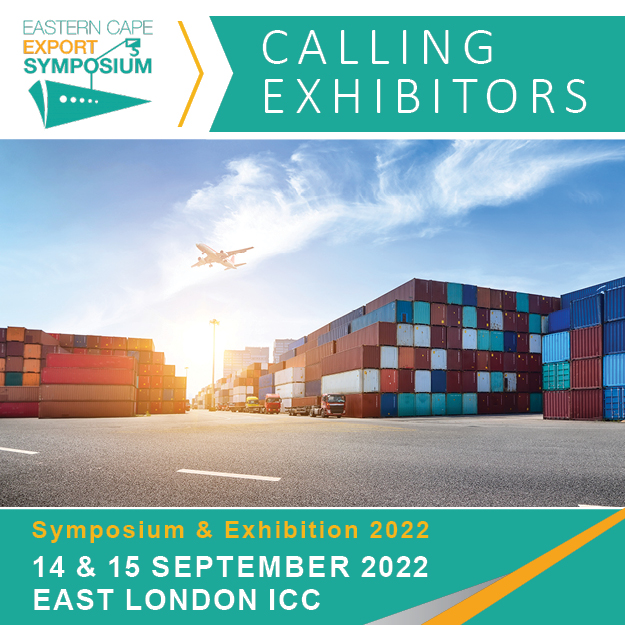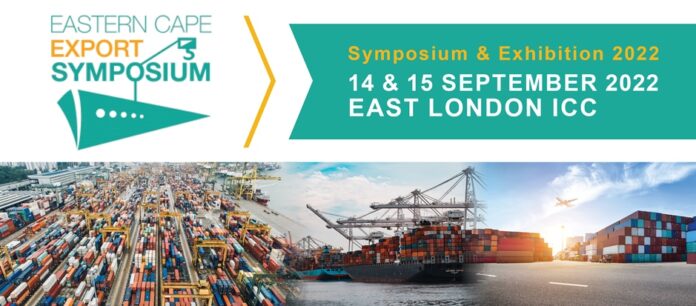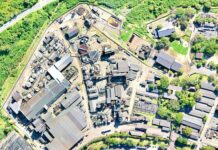The Eastern Cape Development Corporation (ECDC) will host the fourth annual Eastern Cape Export Symposium and Exhibition in September with a vision of accelerated export growth from the region which boasts no less than three ports and two special economic zones.
While the Eastern Cape on South Africa’s eastern seaboard leads the country’s exports in light vehicles, Mohair, Wool and certain agricultural produce, it has yet to reach its full export potential.
The forthcoming Eastern Cape Export Symposium and Exhibition, to be held in person on September 14 and 15 at the East London ICC, will be instrumental in “lifting the lid” on the region’s export ambition, says ECDC Export Director, Phakamisa George.
 “A plethora of resources from funding and market-access opportunities to policy incentives will be shared with prospective and existing exporters as a means to not only broaden the base of exporters but grow existing exports.’’
“A plethora of resources from funding and market-access opportunities to policy incentives will be shared with prospective and existing exporters as a means to not only broaden the base of exporters but grow existing exports.’’
Under the theme International trade – a lever for economic recovery, the symposium is timed in the midst of the pandemic which has radically restrained trade and networking opportunities world-wide.
The ECDC believes pent-up demand has created an appetite and an opportunity for trade which has been further strengthened by the African Free Trade Agreement and its incentives for intra-African trade among the ongoing development of other export incentives, efficiencies and trade agreements.
“That intra-African trade constitutes only 16% of total trade in Africa is alarming but also points to the scale of the opportunity.’’
George says the Eastern Cape seeks to extend its markets for both existing and new products in a range of sectors, some of which already demonstrate the quality of produce and efficient global distribution achieved through the region’s committed supply chain. These sectors include, but are not limited to, automotive and agriculture (livestock, mohair, wool, citrus, timber, tea and agri-processing).
The Eastern Cape is the country’s biggest lemon producer, exporting more lemons than the US, Brazil, Egypt or Italy and also exports more than half of South Africa’s light vehicles. According to data released by the Department of Agriculture, Land Reform and Rural Development (DALRRD), the Eastern Cape has the largest percentage of the country’s livestock – 38% of its goats, 30% of its sheep and 25% of its cattle. It produces more than 15-million kilograms of wool a year and supplies more than half of the world’s mohair. The province is also home to 16% of the country’s milk producers, which account for 26% of the milk produced in South Africa.
“There is massive opportunity for growth of exports across numerous sectors,” says George. “From agriculture to technology the Eastern Cape has already demonstrated its capability.”
George also points out that East London remains the only South African port to export live animals in South Africa, and sought to increase exports of this nature, while the province had also started investing in cannabis production as a breakthrough commodity in the commercial space.
While the symposium, exhibition and match-making meetings will foster interest from international buyers for locally produced goods, a key aspect of the conference, says George, is to inject energy into the vision and plan held by local export facilitators, including port operators, to optimise the processes that enable export growth.
“When logistics infrastructure works according to our plans, ports and container terminals will have higher capacity and productivity, more shipping lines will be inclined to stop at our ports, freight costs will be reduced, and the result will be evident in export growth.”
Day 1 theme: The Eastern Cape Export Strategy: Infrastructure and Policy
Numerous stakeholders play a role in optimising exports from the region. This session provides these roleplayers, exporters, partners and potential investors with a comprehensive and complete, multi-disciplinary view of the trends, new developments, opportunities, strengths and improvement areas that define and drive the export ambition.
Day 2 theme: Exporters Arise (Essential Updates and Resources)
Prospective and existing exporters require up-to-date information on available support services, resources and policy movements that promote export growth. Fresh among these is the African Continental Free Trade Area (AfCFTA).
The conference line up is made up of policy and export experts, as well as CEO’s of the region’s most prolific and innovative exporters. Match-making sessions will be hosted concurrently, linking exporters to buying agents and country representatives from a range of countries such as the United States of America (USA), the EU, Ghana, U.A.E, Ethiopia, Guinea and Botswana.
“Geopolitical changes caused by global power shifts, the unprecedented global pandemic and the African Continental Free Trade Area are some of the topics to be considered. The discussions on the symposium will look at how the Eastern Cape and businesses within the province can capitalise on these changes for ensuring sustainable economic recovery.”
The exhibition will be hosted in person only and the conference will allow for physical and online participation on:
- Date: 14 and 15 September 2022
- Time: 09h00
- Venue in-contact: East London International Convention Centre
- Registration is required at www.ecexportsymposium.co.za










